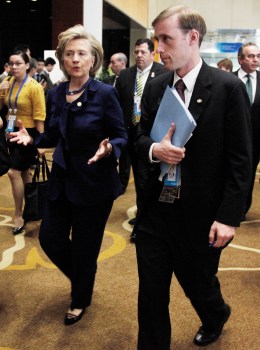
Former Secretary of State Hillary Clinton, walks with Deputy Chief of Staff Jake Sullivan to a meeting in Singapore in 2009.
From the first months of the Obama presidency, it was clear the Obama White House wanted tight control over the administration’s foreign and national security policy. Just a few months into his second term, some key staffers have moved the mile between State and the White House, making it look as if Obama will be even more hands-on in his second term.
From Iraq to Afghanistan to Russia and China, a close circle of advisers dominated big decisions in the first term. Whether it was early reversals like retreating from the promise to close Guantanamo, to recent decisions like releasing details of the administration drone policy, chief of staff Denis McDonough, National Security Adviser Tom Donilon and Vice President Joe Biden tended to be the last players in the room before Obama made key decisions.
That inner circle still rules. A recent article in Foreign Policy by Vali Nasr, a former aide to Af/Pak czar Richard Holbrooke , looks backwards at the isolation of Hillary Clinton’s State Department. Sunday’s New York Times looks forward to the resurgent role Biden is set to play in Obama’s second term.
As John Kerry starts his job as Obama’s second choice for Secretary of State, the former Massachusetts Senator has an even more immediate indicator of the challenge he will face in trying to influence the President: Kerry’s losing two heavy hitters to his competitors in the vice president’s office and the National Security Council.
After Biden’s national security adviser and long time aide, Anthony Blinken, moved over to become Donilon’s deputy at the NSC last month, Biden poached Hillary Clinton’s deputy chief of staff and policy planning director, Jake Sullivan, to replace Blinken. Sullivan was the reliable point of contact between the White House and Clinton’s 7th floor even when other White House and State staffers were at each others’ throats. Losing him to Biden’s office closes one line of influence to the White House for Kerry.
That announcement was followed by word that Phil Gordon, Clinton’s assistant secretary of State for Europe, had been drafted by his old friend Blinken to be the NSC’s coordinator for the Middle East, North Africa and the Gulf Region. Gordon’s ties to the White House and his influence on Russia and especially Turkey could have been helpful to Kerry, especially as the President shows renewed interest in non-proliferation and manages unrest in the Middle East.
But Kerry can take some solace from the recent coverage of the tight-knit group over at the White House. Nasr’s article makes it clear that Hillary Clinton faced even greater challenges to influencing policy when she started at the State department four years ago, than Kerry does now.

